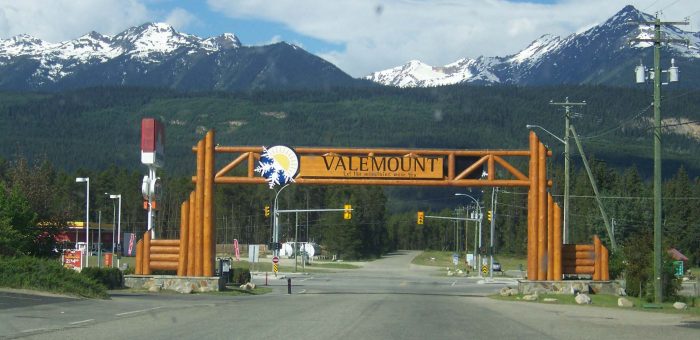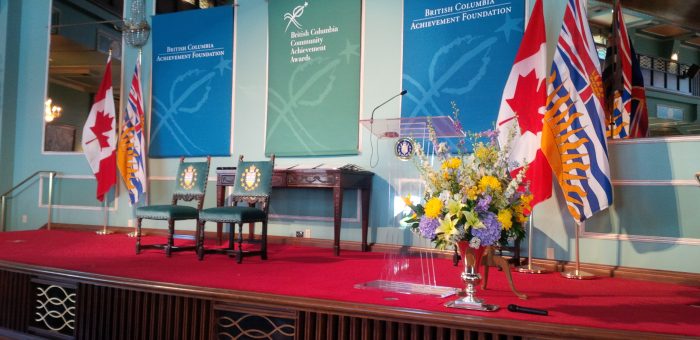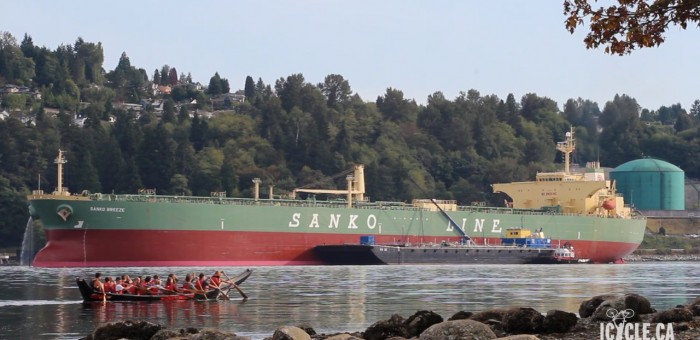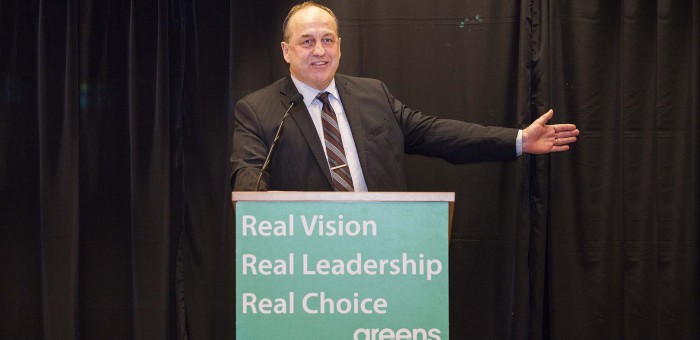Issues & Community Blog - Andrew Weaver: A Climate for Hope - Page 117
An Exciting Opportunity for Tourism & Economic Development in Rural BC
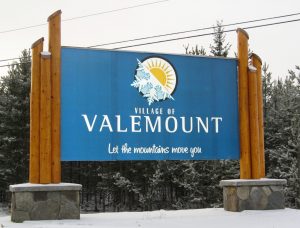 The community of Valemount is located on Southern Yellowhead Highway 5, twenty kilometres south of the intersection with Yellowhead Highway 16 that connects Prince George to Edmonton. With a population (including the surrounding area) of about 2000, Valemount, like so many other rural communities in BC, used to have a forestry-based economy. In the case of Valemount, it was the Slocan mill that was the engine of their local economy. But that mill shut down for good over a decade ago.
The community of Valemount is located on Southern Yellowhead Highway 5, twenty kilometres south of the intersection with Yellowhead Highway 16 that connects Prince George to Edmonton. With a population (including the surrounding area) of about 2000, Valemount, like so many other rural communities in BC, used to have a forestry-based economy. In the case of Valemount, it was the Slocan mill that was the engine of their local economy. But that mill shut down for good over a decade ago.
The people of Valemount and their elected Mayor and Council were resilient. Today Valemount has emerged as a tourism centre in northeastern British Columbia. And it’s about to get a whole lot more exciting.
 Valemount is a natural hub for ecotourism. It is a fully serviced community sitting next to Jasper National Park and Mount Robson Provincial Park. It’s also located near the head of Kinbasket Lake, created when BC Hydro’s Mica Dam was built on the Canoe River. Canoe river is the northernmost tributary within the Columbia River drainage basin. McLennan river, one of the easternmost tributaries of the Fraser River also flows along the northern edge of Valemount.
Valemount is a natural hub for ecotourism. It is a fully serviced community sitting next to Jasper National Park and Mount Robson Provincial Park. It’s also located near the head of Kinbasket Lake, created when BC Hydro’s Mica Dam was built on the Canoe River. Canoe river is the northernmost tributary within the Columbia River drainage basin. McLennan river, one of the easternmost tributaries of the Fraser River also flows along the northern edge of Valemount.
 Whether it be skiing or snowshoeing in the winter or white water rafting, fishing, hiking or even golfing in the summer, Valemount has a diverse array of outdoor activities for the young and old. The town’s push to become an ecotourism hub even extends to the town’s high school, home to about 75 students. In 2012, the school became branded as a “mountain school”. The school developed curriculum and learning resources and activities involving outdoor and environmental themes in an attempt to arrest declining enrollment in the area.
Whether it be skiing or snowshoeing in the winter or white water rafting, fishing, hiking or even golfing in the summer, Valemount has a diverse array of outdoor activities for the young and old. The town’s push to become an ecotourism hub even extends to the town’s high school, home to about 75 students. In 2012, the school became branded as a “mountain school”. The school developed curriculum and learning resources and activities involving outdoor and environmental themes in an attempt to arrest declining enrollment in the area.
Over the last few months I became more and more intrigued about the proposed Valemount Glacier Destination year round ski and sightseeing resort.
On Friday last week, shortly before meeting to learn more from key executives in the Pheidias group, Valemount Glacier Destination’s project proponent, I also met with Gord Stewart, Senior Vice President, and Philip Hochstein, President, of the Independent Contractors and Businesses Association of BC (ICBA). As noted on their website:
“The Independent Contractors and Businesses Association of B.C. services and represents B.C.’s construction sector. ICBA’s 1,100 members build in the multi-family residential and Industrial, Commercial and Institutional (ICI) construction sectors and are involved in virtually all major capital projects in British Columbia.“
The purpose of my visit to the ICBA was to connect with Mr. Hochstein about his work with the ICBA and to learn more about the objectives and priorities of the ICBA and its member organizations. Our conversation centred around responsible resource development. The discussion was far reaching. I emphasized the need for bottom-up project development that starts with community involvement from day one, businesses internalizing externalities, and government clearly outlining and enforcing the regulatory environment and ensuring compliance with it. We both agreed that the construction industry recognizes that project development must be done responsibly. Mr. Hochstein’s challenge to me, a challenge that I accepted, was to define for him what “responsibly” means. I will be working on that in the weeks ahead.
This is an important challenge since in British Columbia, it seems like it is impossible for any resource project to move forward without meeting substantive resistance. In a forthcoming piece I will outline a number of key reasons why I perceive this to be the case as well as solutions as to how we might collectively move forward. The number one reason in my forthcoming post is this:
- Bottom up project development. Before a project can even get off the ground, local towns and First Nation communities must be treated as partners. After all, our natural resources are more often than not located in traditional First Nation territory and the back yards of our rural communities. Attempting to market a project to a community in a top-down fashion is bound to fail. On the other hand, if First Nations and local towns are supportive, they will become the strongest advocates for the projects.
So what has this got to do with Valemount Glacier Destination — absolutely everything. Some of you might have been following the controversy surrounding a proposed ski development at Jumbo Glacier. Not only was the nearby town of Invermere opposed to the project, but so were the Ktunaxa Nation who ended up in the Supreme Court. But in every failure is the birth of a new opportunity and that is what is playing out now in Valemount.
In a rare example of community-driven success, the genesis of the entire project was actually a phone call from a small citizen delegation authorized by the mayor and council of Valemount in 2011. The phone call was a simple request that Oberto Oberti, distinguished architect and president of the Pheidias Group, consider a proposal similar to what was proposed in the Jumbo Valley for the Valemount area. The Valemount delegation (which would go on to form the Valemount Ski Society), outlined how a project with good elevations (over 3000m), summer skiing on glaciers, as well as world-class year-round sight seeing could be achieved in the immediate area around Valemount, but better still, without the construction of significant new roads into remote valleys. In short, a world-class high alpine development could be achieved in the front country of the Robson Valley, in a busier highway, with a more exclusive existing market-base (Edmonton and Jasper) as opposed to the more competitive market base of Calgary, Banff and the Kootenays. A project in Valemount would also be located very close to, but not within the UNESCO World Heritage Sites of Mt. Robson Provincial, and Jasper National Parks. Oberto Oberti’s first action after receiving the phone call was to arrange a meeting with the Simpcw Nation. The resulting collaboration of local support has survived three changes in Mayor and Council at both the municipality of Valemount and the Simpcw First Nation and no organized opposition has yet to come forward against the project.
After some initial seed money to achieve a Master Development Agreement, a small group of Vancouver based investors who founded Valemount Glacier Destinations Ltd. was joined by Greg Marchant and Hunter Milborne of a larger Toronto investment community. As such, a very rare kind of project has emerged in which a small town joined forces with the local First Nation, solicited expertise from Vancouver, and will build Phase One entirely with no real estate pre-sales with Canadian investment. The undertones of Nation Building can not be denied in this aligning of forces. The Canadian investors are already lined up to make this project a reality and open for skiing by the time the 2017/18 ski season gets underway. But of course, that’s only if the BC government will give its final approval.
So what’s special about this project. I encourage you to see for yourself by browsing through the 325 page Master Plan. In particular, have a look at Appendix 3, Valemount Resort Environmental Impact Assessment put together by Vancouver-based Enkon Environmental Limited. I’ve seen a number of Environmental Assessments over the years and this one strikes me as a particularly fine example of what can be done.
The Pheidias Group have a vision for an environmentally sensitive year round ecotourism resort that will provide visitors to British Columbia with another destination rivaling that of Whister-Blackcomb. It will give visitors stunning views of Mount Robson, the highest mountain in the Canadian Rockies. The peak elevation of the site is on Mt. Arthur Meighen (3,205 metres). Compare this to the peak elevations at Whistler (2,240m), Blackcomb (2,440m), Sun Peaks (2,080m), Mount Washington (1,588m), and Big White (2,319). The high peak elevation is such that skiing on glaciers will likely be year round for quite some time to come. In addition, this elevation, coupled with a more northerly location bodes well for long term operations in light of ongoing global warming and the increased likelihood of more precipitation at lower elevations and latitudes in the form of rain instead of snow in the years ahead. What’s more, the resort has the potential to be carbon neutral by tapping into the nearby 5.7 MW Hystad Creek small scale hydro project. There’s also incredible geothermal energy potential in the region.
After meeting with the Pheidias Group, peppering them with questions, taking copious notes, and subsequently reading the Master Plan, it’s clear to me that this is an exciting project that I am keen to see move forward. So what’s the delay?
The irony is that for a government so proud of touting the “let’s get to yes” mantra and so chuffed with itself for proclaiming in law that the first Wednesday in March is “Red Tape Reduction Day“, the delay falls squarely in the realm of government red tape precluding the project from getting to yes.
The project is six months behind and the latest layer of red tape is a bizarre new requirement for a four lane 80 km/hr highway to take skiers on an 8km journey from Valemount to the Resort Base village.
Valemount Glacier Destination is an ecologically sensitive project that will provide an incredible economic stimulus to northeastern BC. In the words of Oberto Oberti, President of the Pheidias Group, “We want to work with nature, not against nature”.
If the BC government spent a fraction of the energy they are spending in a desperate attempt to land a hypothetical LNG facility on actually moving real projects forward, we would be leading North America in the development of a 21st century diversified economy.
The “forces of no” within the BC Liberal government really need to “get to yes” in a timely fashion on this project.
Congratulations to Judy Fainstein & other BC Community Achievement Award Winners
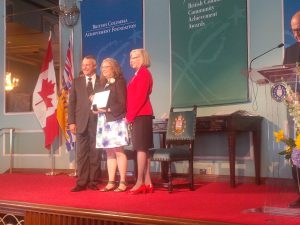 Today I had the distinct honour of attending the 2016 British Columbia Community Achievement Award ceremony at Government House. The Honourable Judith Guichon, OBC, Lieutenant Governor of British Columbia and the Honourable Peter Fassbender, Minister of Community, Sport and Cultural Development presented 32 British Columbians with distinguished awards “in recognition of their outstanding community contributions“.
Today I had the distinct honour of attending the 2016 British Columbia Community Achievement Award ceremony at Government House. The Honourable Judith Guichon, OBC, Lieutenant Governor of British Columbia and the Honourable Peter Fassbender, Minister of Community, Sport and Cultural Development presented 32 British Columbians with distinguished awards “in recognition of their outstanding community contributions“.
Among the recipients were four Victoria area residents: Haji Charania, Judy Fainstein, Barbara Hulme, Dr. Bernadette Pauly.
It was moving to listen to the citations for each and every one of these incredible British Columbians. Their dedication to the betterment of our communities is an inspiration to us all.
I would like to single out one award winner whose name many of you might recognize. And that is Judy Fainstein, who works in my Constituency Office. As noted in her citation:
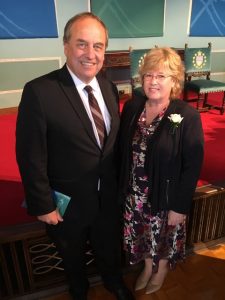 Judy Fainstein has served as a community leader who inspires thousands of youth in British Columbia. Ten years ago, she started Youth for Environmental Stewardship (YesBC) to help young people become environmental leaders. Judy has ensured that the youth she works with take a leading role and this innovative approach has grown the organization into a meaningful and effective environmental education group in BC.
Judy Fainstein has served as a community leader who inspires thousands of youth in British Columbia. Ten years ago, she started Youth for Environmental Stewardship (YesBC) to help young people become environmental leaders. Judy has ensured that the youth she works with take a leading role and this innovative approach has grown the organization into a meaningful and effective environmental education group in BC.
Anyone who has had the pleasure of working with Judy will know how deserving she is of this award. I am truly fortunate to work with Judy and I can assure the residents of Oak Bay-Gordon Head that they are well served by such a dedicated constituency assistant. Below I attach a video of Judy receiving the award.
Congratulations to Judy and congratulations to all winners of the 2016 BC Community Achievement Award.
Celebrating Local Businesses in our Community – Axine Water Technologies Inc.
At times, discussing the challenges facing our environment – especially as it pertains to expansive issues like water pollution – can be overwhelming and discouraging. While these worries are not misplaced, it’s important to talk about solutions and appreciate improvements too. Yes, there are a lot of obstacles ahead of us, but there are also a lot of amazing people in BC working to improve the way we interact with the environment. Clean tech, in particular, is an incredibly inspiring sector.
 In March, before the spring legislative sitting got too busy, I had the distinct honor of visiting a clean tech company that is transforming the way industrial companies treat their wastewater; Axine Water Technologies Inc., based on UBC’s Vancouver campus. Jonathan Rhone, Axine’s Chief Executive Officer, and Jessica Verhagen, the Business Development Executive, walked me through the basics of their electrochemical technology and took me on a tour of their facility. It was a morning that left me marveling at human ingenuity and excited about the potential for progress in reducing the environmental impact of a wide range of industries.
In March, before the spring legislative sitting got too busy, I had the distinct honor of visiting a clean tech company that is transforming the way industrial companies treat their wastewater; Axine Water Technologies Inc., based on UBC’s Vancouver campus. Jonathan Rhone, Axine’s Chief Executive Officer, and Jessica Verhagen, the Business Development Executive, walked me through the basics of their electrochemical technology and took me on a tour of their facility. It was a morning that left me marveling at human ingenuity and excited about the potential for progress in reducing the environmental impact of a wide range of industries.
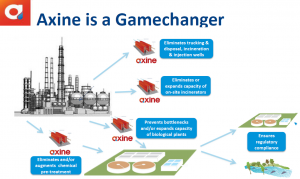 Axine has developed an innovative, low cost, chemical-free way for large companies to clean industrial wastewater by removing high concentrations of complex, toxic organics and ammonia. Their system has simultaneously solved a multi-billion dollar headache for companies, and a staggering environmental problem.
Axine has developed an innovative, low cost, chemical-free way for large companies to clean industrial wastewater by removing high concentrations of complex, toxic organics and ammonia. Their system has simultaneously solved a multi-billion dollar headache for companies, and a staggering environmental problem.
Over 10 billion pounds of toxic chemical wastewater are produced annually from chemical, pharmaceutical, petroleum product, and electronic manufacturers in the US. As Jonathan told me in our meeting, that wastewater is becoming more complex, hazardous, difficult, and expensive to treat, posing a growing threat to communities and industry.
“Billions of gallons are so toxic that the only solution is to truck it off-site to be incinerated or pumped into a deep injection well,” he continued. Jessica added that these wastewaters are subject to increasingly stringent regulations, putting pressure on industry to find the lowest cost solutions.
 In a system that requires far less electricity than other electrochemical processes, Axine uses electrolytic cells to create free radicals that react with organic compounds, breaking them down into water, nitrogen, a small amount of carbon dioxide and a high-quality stream of hydrogen. Cells are combined in a modular system that is scalable, versatile, and easily adjusted to accommodate different volumes. It requires no chemicals, produces no sludge and can be used to process a wide range of industrial effluent. Once treated, cleaned water can be reused on site, greatly reducing overall industrial water use.
In a system that requires far less electricity than other electrochemical processes, Axine uses electrolytic cells to create free radicals that react with organic compounds, breaking them down into water, nitrogen, a small amount of carbon dioxide and a high-quality stream of hydrogen. Cells are combined in a modular system that is scalable, versatile, and easily adjusted to accommodate different volumes. It requires no chemicals, produces no sludge and can be used to process a wide range of industrial effluent. Once treated, cleaned water can be reused on site, greatly reducing overall industrial water use.
Their system can be integrated into existing treatment plants to target specific pain points without disrupting operations, Jonathan explained. “Our service model enables customers to access the technology with minimal capital investment and technology risk. We eliminate off-site trucking and disposal, reduce production bottlenecks, increase water reuse and ensure compliance with discharge standards.”
 To see their design in action Goran Sparica, their Senior Vice President of Engineering and Operations, took me on a tour of their lab. Amongst the engineers in lab coats were a series of sealed off compartments with glass windows. Some seemed to have wastewater mid-treatment, with murky water on one side and clear water on the other.
To see their design in action Goran Sparica, their Senior Vice President of Engineering and Operations, took me on a tour of their lab. Amongst the engineers in lab coats were a series of sealed off compartments with glass windows. Some seemed to have wastewater mid-treatment, with murky water on one side and clear water on the other.
“Very toxic,” Goran mentioned as we passed a fridge filled with hazardous waste. Stopping at their field pilot prototype Goran explained how waste-water can be treated in 24 hours, noting that there is nothing like this in the world, “we’re the first to do it.”
Though there is huge interest in their technology from China and India, they are going to finish testing in North America before they further explore that market.
 To help the sector compete globally, however, the clean tech sector in B.C. and Canada will need industry-specific leadership from provincial and federal governments. Axine was among the nearly 200 clean technology companies from across Canada that wrote to the federal government last month, asking for focused budgetary support.
To help the sector compete globally, however, the clean tech sector in B.C. and Canada will need industry-specific leadership from provincial and federal governments. Axine was among the nearly 200 clean technology companies from across Canada that wrote to the federal government last month, asking for focused budgetary support.
The clean tech industry in Canada is composed of more than 800 firms that are environmentally safe, diverse, and employ more than 50,000 people. By 2022 it is expected to be a $50 billion dollar industry. It is Canada’s fastest growing sector.
Back on a smaller scale, Jonathan spoke fondly of the company they are developing. “We have incredible employees. Lots of young people who are so passionate about what they’re doing. We’re having a ton of fun, solving environmental problems on the ground floor and building a more sustainable economy.”
NEB Decision on Kinder Morgan Completely Flawed
Media Statement: May 19, 2016
Andrew Weaver – NEB decision on Kinder Morgan completely flawed
For Immediate Release
Victoria B.C. – In response to the Kinder Morgan announcement by the National Energy Board, Andrew Weaver, Leader of the B.C. Green Party and MLA for Oak Bay-Gordon Head has issued the following statement:
“I’m not surprised by the announcement. Kinder Morgan’s Trans Mountain pipeline, and the approval process it went through, appeared rigged from the start,” says Weaver. “As a participating intervenor I watched as other intervenors withdrew in frustration because they knew their participation was futile.”
“Within the limited constraints of the NEB process I submitted nearly 500 questions to Kinder Morgan which focused primarily on the risk and impact of a potential oil spill, the scientific underpinning of the oceanographic analysis used, and the extent of consultation done by the company. It was clear that the process for this project was not about assessing the best scientific evidence, or whether it was in the interests of British Columbians, but was more of a box-ticking exercise.”
“Fundamentally we don’t have the science or the capacity to deal with a diluted bitumen spill on our coast. The provincial government has voiced its opposition to this project already, and even with all the conditions placed on the project, I don’t see how the province could now turn around and approve it.”
Andrew Weaver was the only BC MLA to seek and receive intervenor status for the NEB Hearing Process. He has been involved in the process since December 2013 when he applied.
-30-
Media Contact
Mat Wright
Press Secretary – Andrew Weaver MLA
Cell: 250 216 3382
Mat.wright@leg.bc.ca
Twitter: @MatVic
Parliament Buildings
Room 027C
Victoria BC V8V 1X4
End of Spring Session Re-Cap
Media Release: May 18, 2016
Andrew Weaver – End of Session Recap
For Immediate Release
Victoria B.C. – Andrew Weaver, Leader of the B.C. Green Party and MLA for Oak Bay-Gordon Head has shown that BC politics needs BC Green voices.
“The past few months have shown that the B.C. Green Party can get things done,” says Weaver. “We are willing to work with whoever is in government to advance sound policy that benefits all British Columbians.”
Over the past four months the provincial government has adopted a number of ideas the BC Green Party Leader brought forward. Most significantly, the Sexual Violence and Misconduct Policies Act – the only private member’s bill passed by a government in decades. The government has also adopted his suggestions to close property tax loopholes and gather information on Vancouver’s housing market.
“I think it’s becoming increasingly clear that British Columbia needs more BC green voices in its legislature,” said Weaver. “There are issues that both the BC Liberals and the BC NDP would never discuss were it not for my office bringing them up. I do not think there would be any significant opposition to LNG, nor a bill protecting students in universities, were it not for the BC Greens.”
“As we move towards the 2017 election, the question I think British Columbians will be asking themselves is which party is getting things done? The BC Greens have demonstrated that they will work hard in the best interests of B.C. as a whole. We will leave politics behind when there are opportunities to find solutions and common ground. This is the type of leadership we need in British Columbia.”
-30-
Media Contact
Mat Wright – Press Secretary, Andrew Weaver MLA
1 250 216 3382
mat.wright@leg.bc.ca

